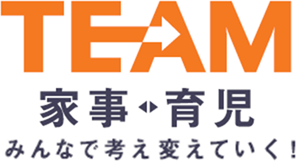The revised Child Care and Family Care Leave Law went into effect in October, and it is hoped that the introduction of “postnatal father childcare leave” and the ability to take childcare leave in installments will increase the rate of fathers taking childcare leave and encourage men to participate in childcare. On the other hand, one in three fathers who take childcare leave spend less than two hours a day on housework and childcare, which is called “take-only childcare leave,” and is seen as a problem.
We asked Tsuneko Takaso, director of the NPO Fathering Japan and child-rearing advisor, what can be done to realize a father’s “child-rearing business” that allows him to share housework and child-rearing duties effectively and keep his family smiling.

Everyone is a “newbie” at first. I want fathers to know more about pregnancy and childbirth.
I think one of the reasons for “take-only childcare leave” is that fathers do not know much about pregnancy and childbirth. While mothers gain knowledge by researching various topics and learning at classes for mothers, fathers, although there are classes for parents such as antenatal care and bathing instruction, the first three or so classes are for mothers, and they enter child-rearing with a lack of understanding. The reason why fathers end up “taking only childcare leave” is because they are in a “newbie” state, like new employees, who do not know what to do at first unless someone teaches them how to do their job.
On the other hand, mothers are newcomers at first, and there are many things they don’t understand. I think it is important for couples to increase their knowledge of pregnancy, childbirth, and child rearing together during pregnancy.
In particular, postpartum is said to be “like an injury or a car accident that takes two months to heal,” so much so that the physical damage is severe and many people have mental surges that make their minds unstable. It is a time when mothers have to recover their own bodies. Many fathers lament that “it’s hard when mom is cold to me” or “mom is angry” during such a period, but I think it is necessary for fathers to know more about mom’s condition after childbirth and to increase their knowledge of the prenatal and postpartum period to make sure they are well informed.
Ideally, parents should start childcare at the same time.
In order to share childcare well, I think it is important to try to do it with mom from the time the baby is born. Being a mom does not mean that you are better at changing diapers or carrying the baby. Moms can do it because they are with their babies every day. For example, if a mother changes 10 diapers a day, that is 300 diapers in a month. On the other hand, if a father changes only one diaper a week, or four a month, the gap in child-rearing experience will only widen. I wouldn’t go so far as to say that home births are “bad” either, but the father’s child-rearing experience is clearly less than the mother’s. Ideally, the father should take a vacation or other leave around the due date and start taking care of the baby at the same time.
The communication that moves dads is “eye messages.
The secret to successful fathercare is to just tell them.
I often hear people say, “I gave up on my husband because he would do it if I told him, but if I didn’t tell him, he wouldn’t do it at all.” Instead of giving up, try telling him something specific and gentle like, “I wish you would watch the baby while I’m cooking dinner.
If fathers realize that the most difficult time for their children is from evening to dinner, bathing them, and putting them to bed, they may try to finish work early and go home after childcare. If they realize this, they will naturally change their behavior. But in reality, many moms give up and don’t tell their dads, saying, “My dad is too busy with work. If moms don’t speak up, it is difficult for dads to change.
There is a knack to the way we communicate.
Why won’t (you) do it?” I messages are less likely to cause resistance or rebellion in the other person’s mind than You messages, which use the other person as the subject, and are more likely to convey what you want. It is easier to convey what you want them to do.

Becoming a proactive dad through a series of one-operator success stories
I think it is important for the future that both mom and dad be able to turn around there, even if not perfectly, so that they can raise their children as a one-operator.
It is also effective for mom to make errands to go out and ask dad to take care of the kids. If mom is not there, dad will have to do it alone. If the crying stops for the time being, it is a success. If the child manages to eat and go for a walk in the park, etc., the accumulation of successful experiences should encourage the father to take the initiative in child-rearing. Moms should have the courage to let dads do the work.
Use family smiles as an indicator of success in childcare!
If parents use the words “thank you” and “sorry” on a daily basis, children will naturally use the same words. Children learn language and communication from their families. Let’s be aware of this on a daily basis, cooperate with each other, and remember to say thank you and thank you.
Also, it’s important to be a little less picky. We don’t want perfection.
It is a great success if the family can enjoy the nurturing business anyway, using the indicator of whether there are proper smiles in the family.











